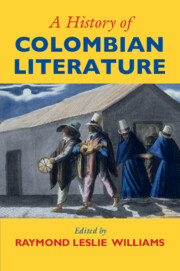Book contents
- Frontmatter
- Contents
- Notes on contributors
- Preface
- Introduction
- PART I LITERATURE AND SOCIETY IN COLOMBIA
- PART II COLOMBIAN CULTURE AND SOCIETY IN REGIONAL CONTEXTS
- PART III BEYOND THE BOUNDARIES
- 15 García Márquez as public intellectual
- 16 Women writers in Colombia
- 17 Colombian queer narrative
- 18 Extracting nature: toward an ecology of Colombian narrative
- 19 Visions of nature: Colombian literature and the environment from the colonial period to the nineteenth century
- 20 The intersections between poetry and fiction in two Colombian writers of the twentieth century: Álvaro Mutis and Darío Jaramillo Agudelo
- AFTERWORDS
- Index
- References
17 - Colombian queer narrative
from PART III - BEYOND THE BOUNDARIES
Published online by Cambridge University Press: 05 June 2016
- Frontmatter
- Contents
- Notes on contributors
- Preface
- Introduction
- PART I LITERATURE AND SOCIETY IN COLOMBIA
- PART II COLOMBIAN CULTURE AND SOCIETY IN REGIONAL CONTEXTS
- PART III BEYOND THE BOUNDARIES
- 15 García Márquez as public intellectual
- 16 Women writers in Colombia
- 17 Colombian queer narrative
- 18 Extracting nature: toward an ecology of Colombian narrative
- 19 Visions of nature: Colombian literature and the environment from the colonial period to the nineteenth century
- 20 The intersections between poetry and fiction in two Colombian writers of the twentieth century: Álvaro Mutis and Darío Jaramillo Agudelo
- AFTERWORDS
- Index
- References
Summary
Introduction
I would like to begin with a quote from the scholar of Colombian literature J. Eduardo Jaramillo-Zuluaga (1957–2008), in which he states that the greatest pleasure in reviewing recent Colombian narrative is returning to previously known works; in doing so, we restore the certainty of our perplexity. He refers to the greatest pleasure of literature as the moment in which one revisits these past texts; in exploring a different meaning, they betray the interpretations attributed to them in previous readings. Needless to say, understanding the representation of contemporary queer narrative in Colombia continues to enlighten us today about issues that concerned the earliest Colombian queer writers.
The word “perplexity” is accurate in describing the extraordinary literary production and cultural work that queer writer Porfirio Barba Jacob produced in his poetry in the early twentieth century. He was an extraordinary poet and has been followed and never forgotten for his contributions to Colombian literature. Marta Elena Casaús Arzú appropriately describes some of his pursuits as follows:
Participó con el pseudónimo de Ricardo Arenal, en varios diarios guatemaltecos entre ellos, el Diario de Centroamérica, El Demócrata y Nuestro Diario. Desde que inició su trabajo en Guatemala tenía la obsesión de crear una nueva revista Ideas y Noticias, bajo el amparo del director de El Imparcial, Alejandro Córdova.
[Under the pseudonym of Ricardo Arenal,Porfirio Barba Jacob contributed to several Guatemalan newspapers including Diario de Centroamérica, El Demócrata and Nuestro Diario. From the start of his work in Guatemala, he was obsessed with creating a new magazine Ideas y Noticias, under the patronage of the director of El Imparcial, Alejandro Córdova.(2011:96)]
He was a gay writer at a time when being homosexual was considered a disgrace and reason enough to be alienated from mainline Colombian society. His great poems describe a deep anxiety that can be understood as a state of being “displaced,” a feeling about which other Colombian queer writers have written in a variety of texts. Some queer writers have chosen exile to other countries as the solution. I define “exile” as a condition for queer authors, given that many queer Colombian writers have lived or are living in exile. Exile can be understood not only as leaving one's country, but also leaving small towns for large cities, or leaving the nuclear family for different groups that are more receptive.
- Type
- Chapter
- Information
- A History of Colombian Literature , pp. 342 - 362Publisher: Cambridge University PressPrint publication year: 2016
References
- 1
- Cited by



